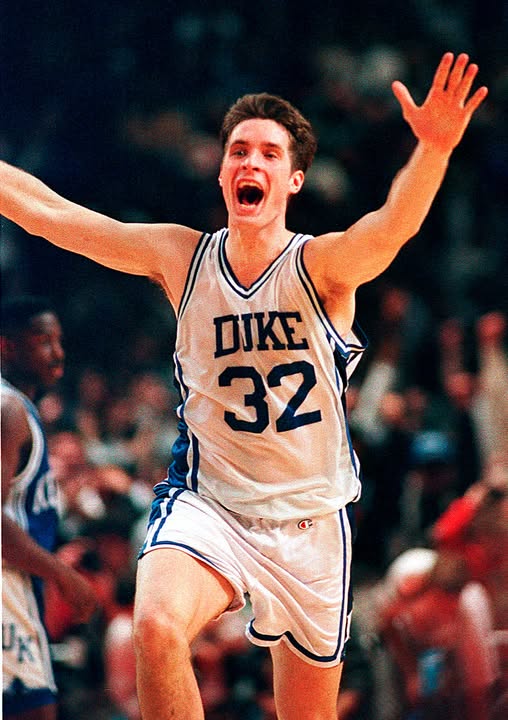In the long, storied history of NCAA basketball, certain moments transcend sport and etch themselves into the collective memory of fans across generations. One such moment occurred on March 28, 1992, in Philadelphia at the Spectrum, during the East Regional Final of the NCAA Tournament. What took place in the final seconds of that game between Duke and Kentucky has become so iconic, so emotionally gripping, that it is simply referred to as “The Shot.” The man responsible was Christian Laettner, Duke’s fiery forward who already had a reputation for delivering under pressure. But in that moment, with the weight of a Final Four berth on the line and mere seconds to act, Laettner delivered one of the most unforgettable plays in sports history. And with it, he didn’t just send Duke back to the Final Four—he forever changed the landscape of college basketball and ushered in a new era for Duke athletics.
At the time, Duke was the reigning national champion, led by the legendary Mike Krzyzewski. The Blue Devils had finally broken through in 1991 after years of near-misses, capturing the program’s first national title. That 1992 squad was even better. It had Laettner, Grant Hill, Bobby Hurley, and Thomas Hill—each a vital piece of a perfectly calibrated machine. Kentucky, on the other hand, was amid a resurgence under Rick Pitino, having endured NCAA sanctions in the late ’80s. The Wildcats’ team, dubbed “The Unforgettables,” featured a group of seniors—Richie Farmer, Deron Feldhaus, John Pelphrey, and Sean Woods—who had endured the tough times and were now on the brink of returning Kentucky to national prominence. It was a game already steeped in storylines and raw emotion. But no one could have predicted how it would end.
The contest itself was a masterpiece. The teams traded blows in a high-octane, high-drama affair that went into overtime. As the minutes dwindled, it became clear this was not just another game—it was a clash of wills, a test of nerve, and a war of endurance. With 2.1 seconds remaining in overtime, and Kentucky ahead 103-102 after a remarkable running banker by Sean Woods, Duke had the ball under its own basket and the season on the line. There was time for just one shot. Just one play. What happened next would become an immortal sequence replayed endlessly on highlight reels, documentaries, and sports networks for decades to come.
Grant Hill stood on the baseline with the ball in his hands. The play called for him to attempt a full-court pass, threading the needle through Kentucky’s press. His pass was majestic—an absolute dart that traveled 79 feet in the air and fell gently into the hands of Laettner, who caught it at the free-throw line at the other end of the court. Laettner, cool and composed, had just enough time to make a move. He faked right, dribbled once, turned back to his left, rose up, and released a fadeaway jumper as the horn began to sound. The ball arced through the air with poetic grace before swishing cleanly through the net. Final score: Duke 104, Kentucky 103.
Laettner’s teammates mobbed him. Fans exploded into cheers and tears. In the blink of an eye, Duke had won one of the greatest games ever played. For Kentucky, the heartbreak was immense. Their Cinderella run had ended in the most painful fashion imaginable. For Duke, it was validation, glory, and destiny wrapped into one. It was also a seismic moment for the sport itself—proof of how college basketball could produce drama and magic on par with any other spectacle in American culture.
Christian Laettner’s performance in that game was nothing short of legendary. He finished with 31 points and didn’t miss a single shot—10 for 10 from the field, 10 for 10 from the free-throw line, and 1 for 1 from beyond the arc. Statistically perfect in one of the biggest games of his career, and the defining moment came on the very last play. But it was not just the numbers that mattered—it was the poise, the timing, and the presence of mind to execute flawlessly under pressure. That shot catapulted Laettner into the pantheon of college basketball immortality and solidified his reputation as one of the game’s greatest clutch performers.
But “The Shot” wasn’t just about Laettner or even just about Duke. It became symbolic of everything great about March Madness—the unpredictability, the drama, the heroes, and the heartbreak. It was a snapshot of athletic excellence and emotional intensity, wrapped into one play that continues to define an era. In many ways, it was the turning point where college basketball stepped into the mainstream cultural consciousness. It elevated the NCAA Tournament from a beloved institution into a national obsession. The drama of March Madness was now inescapable, and every buzzer-beater since has lived in the long shadow of Laettner’s masterpiece.
For Duke, that moment marked a permanent shift in identity. The Blue Devils were no longer the perennial contenders who fell just short. They were now the team that delivered, that crushed dreams, that found a way. Under Coach K, Duke would go on to win the 1992 national title, the first team to repeat as champions since UCLA in the early 1970s. The program became a dynasty, and the recruiting pipeline…



